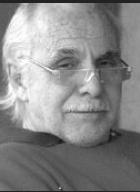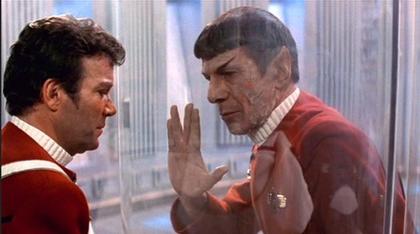|
There have been entertainment news stories recently about how Harrison Ford might return in the next Star Wars film, though his one condition appears to be that his 'Han Solo' character be killed off. The speculation reminded me of another similar tale, when a reluctant star of a fabled movie-series was sought to make a return, but couldn't be budged -- until, of all people, the screenwriter got involved. It's actually a pretty renowned incident, but the tale behind it is little-known. To the point of probably unknown. And in the end, it not only saved a movie, but also a franchise. And perhaps a franchise that followed. And more. The screenwriter in question was a friend of mine, Jack Sowards. Or -- Jack B. Sowards, as he wrote by. Jack was a joy. A crusty, warm-hearted, nurturing free-spirit -- recognized by all from his gray ponytail -- who'd had a long career, first as a very minor actor, and then as an accomplished writer, almost exclusively for TV. Notably Westerns. Jack wrote a whole lot of episodes of Bonanza, as well as The High Chaparral and Daniel Boone. But he also wrote extensively for Falcon Crest, The Streets of San Francisco and Barnaby Jones, and many others, including some made-for-TV movies. However, in his long career, he only wrote one feature film. But boy, howdy, it was a doozy. For his one feature film, Jack Sowards wrote Star Trek II: The Wrath of Khan. Not only was it an impressive credential, especially when it's your only feature-film for some reason, but The Wrath of Khan is considered by Star Trek fans and others as one of probably the two best of that film series. To many, it is the best. (It's worth noting that Jack did also later write one episode of the TV show, Star Trek: The Next Generation. The episode is titled, "Where Silence Has Lease," if you ever decide to track it down.) Great as Star Trek II: The Wrath of Khan was, it almost didn't come to be, at least not in the form we know it. That's because after a lifetime of being fed up playing the character of Mr. Spock -- even to the point of writing an autobiography titled, I Am Not Spock, actor Leonard Nimoy had finally had enough. No more. He wouldn't play the character again. That's it, over and done. No, he would not be in Star Trek II. He'd done the first feature film, but that was all. Sorry, goodbye. The film's producers were ready to throw in the towel. They'd tried everything to interest Nimoy, but it was to no avail. The would have to make the next Star Trek movie without one of its two most iconic characters, Mr. Spock. Okay, that's it. Suck it in and let's move on. That's when Jack Sowards stepped in. He'd been signed as the screenwriter of the film, and told the producers that "I know how to get Leonard to agree." The producers were deeply reticent -- not only because they'd tried, but additionally because in Hollywood few people are used to listening to the screenwriter. But in this case, the producers decided to listen to the writer. After all, what did they have to lose? And they'd known Jack for years, so they knew that if Jack said he could do something, there was a good chance it good be done. All he asked was that the producers set up a call between himself and Leonard Nimoy. He would do the rest. And what he did was quite remarkable. Not so much what he said -- which was smart enough -- but how he went about doing it. Which was brilliant. A lesson of diplomacy, art and most of all, clever planning. All twined together. What follows is as close to what was actually said as I remember Jack telling it. When Jack Sowards and Leonard Nimoy spoke, the actor reiterated his decision to not appear in Star Trek anymore. He was adamant. So, there was nothing Jack could say. But Jack did have something to say. He just asked on simple question -- "Leonard, how would you like to play Spock's death scene?" And that was it, that was the magic question. Not only would Leonard Nimoy get to play an actor's dream -- a big, heart-wrenching dramatic scene that would garner world-wide attention -- but (and perhaps this was even more important), he would never have to face a question about playing Spock ever again. Never more. Spock would be dead. "I'll write the scene near the beginning of the movie," Jack told him. "You'll play Spock's death scene. Be done with it. Leave. You won't have to be in the rest of the movie. And the others can go on without you." It would be a week or two of his time. And Spock would be finished. That was all it took. "Leonard is on board," Jack told the unbelieving producers. Unbelieving, but thrilled. They didn't care that Nimoy wouldn't be in the whole film, all they cared about was being able to make a Star Trek movie that had Mr. Spock in it and that could be advertised as being with Leonard Nimoy. If Spock died in the first 10 minutes, so be it. It still would be Star Trek II with William Shatner and Leonard Nimoy. It was a brilliant move by Jack Sowards -- but -- (and this is the big point) it wasn't the brilliant move. The move that saved everything. Because, you see, in addition to being a wonderful writer, Jack Sowards was a really smart guy, and a Hollywood veteran who knew far more than a thing or two about storytelling and drama. He had another trick up his sleeve. He had the trick up his sleeve. Jack went back to the drawing board, began writing the screenplay to Star Trek II, wrote the death scene for Mr. Spock that indeed took place as he promised early on in the script, and showed it to Leonard Nimoy. The actor loved what he read, and couldn't wait to film the scene. Fine, great, thanks very much. He went off, and Jack went back to working on his screenplay But, of course, like any good professional screenwriter, there's always a lot of rewriting done. And so, as Jack continued along with the draft, he did what he had always planned to do from the first -- he shifted things around. Spock's death was still there -- but...well, it got moved back a little. Now, it was about a third of the way into the script. The new draft then got shown to Nimoy, and he still loved the death scene, And the thing is, he also liked the new material Jack had come up for Spock. And then again, he went off. And Jack went back to...rewriting. And in the next draft, the death scene was now pushed back to halfway into the story. Again showing it to Leonard Nimoy, again getting his approval And in the next draft, it was moved a little further still. And then moved back some more. All the while, Leonard Nimoy was always shown the script, really liked the death scene, but was now especially enjoying the new Spock material, what Jack was doing with the character. What Jack had intended to do all along. And then, finally, Jack Sowards had pushed the death scene all the way to the end of the movie. By this time, Leonard Nimoy absolutely loved everything Jack Sowards had written, loved the script, loved the character, and was there to play Mr. Spock -- for the entire film. Right up to his death scene. But even that's not the end of the story!
Because, you see, what Jack Sowards had done was turn the Spock character into something that Leonard Nimoy liked so much that he not only agreed to make Star Trek II: The Wrath of Khan -- but he wanted now to keep playing Mr. Spock. And he came back for all the rest of the Star Trek films (after the charter was carefully set up to rejuvenate). And then reprised the character in two episodes of the series, Star Trek: The Next Generation, wrote a new autobiography, I Am Spock -- and even agreed to portray the character yet again when the new Star Trek movie re-launch was made, giving the new franchise an important sense of legitimacy. All because producers listened to their screenwriter when Jack Sowards said, "I know how to get Leonard." And in the end, Jack Sowards not only saved Star Trek II: The Wrath of Khan -- but he well may have helped save the rest of the Star Trek movie series...which, in turn, arguably allowed there to be enough interest to start the new franchise all over again. And perhaps it was the continued success of the original feature film series that helped spur interest in the subsequent TV series, as well. Jack Sowards is a name you should know. And if you like Star Trek, be grateful to. A man who really took the meaning of "Live long and prosper" to heart.
3 Comments
Barbara Wenger
3/9/2013 05:54:56 am
The man wasa supremely gifted psychologist who understood his "client"
Reply
Robert Elisberg
3/9/2013 06:00:58 am
You're right. But then, Jack understood a whole lot, and sitting down with him at a lunch was one of those kind of things where you did yourself a disservice if you talked too much, rather than listen. I didn't always agree with all of Jack's opinions -- he was very opinionated -- but he could always defend his thoughts wonderfully and more often than not, he was spot on.
Reply
David K. M. IKlaus
8/14/2013 06:08:15 am
Another example of how one man, in the right place, at the right time, can change the course of millions of lives.
Reply
Leave a Reply. |
AuthorRobert J. Elisberg is a political commentator, screenwriter, novelist, tech writer and also some other things that I just tend to keep forgetting. Feedspot Badge of Honor
Archives
June 2024
Categories
All
|
|
© Copyright Robert J. Elisberg 2024
|








 RSS Feed
RSS Feed